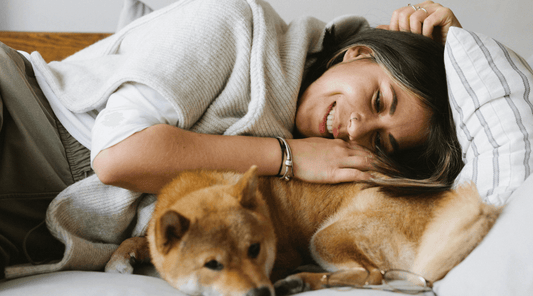
Understanding and Managing Dog Aggression: A Complete Guide
Rachel RobsonShare
Are you struggling with an aggressive dog? You're not alone. Many dog owners face this challenging behaviour, but with the right approach and understanding, you can help your four-legged friend become calmer and more balanced. Let's explore how to recognise, understand, and address dog aggression effectively.
Recognising the Warning Signs
Before your dog displays aggressive behaviour, they'll often show subtle signs of discomfort. Understanding these early warnings can help prevent escalation.
Watch for:
- Stiffened body posture and raised hackles
- A fixed, hard stare
- Showing whites of the eyes (whale eye)
- Low growling or rumbling
- Lip licking and excessive yawning
- Tail position changes, especially if held high and stiff
Common Causes of Dog Aggression
Dogs don't become aggressive without reason. Several factors might trigger this behaviour:
- Fear: Often the most common cause, where dogs feel threatened or cornered
- Resource guarding: Protecting food, toys, or favourite resting spots
- Territory: Defending their home or space
- Pain or illness: Physical discomfort can lead to defensive aggression
- Past trauma: Previous negative experiences affecting current behaviour
- Lack of socialisation: Limited exposure to different situations during crucial developmental periods
Professional Help: Your First Step
If your dog shows signs of aggression, your first port of call should be your veterinarian. They can rule out any underlying medical conditions and refer you to a qualified behaviourist. In the UK, look for experts certified by:
- The Association of Pet Behaviour Counsellors (APBC)
- The Animal Behaviour and Training Council (ABTC)
- Certified Clinical Animal Behaviourists (CCAB)
Managing Aggressive Behaviour
While working with professionals, implement these management strategies:
Identify Triggers: Keep a detailed diary of incidents to spot patterns and triggers
- Create Safe Spaces: Ensure your dog has quiet areas to retreat when feeling overwhelmed
- Use Proper Equipment: Consider a well-fitted head collar or harness for better control during walks
- Maintain Distance: Learn your dog's threshold and keep them at a comfortable distance from triggers
- Practice Prevention: Avoid situations that typically cause aggressive responses
Training Approaches That Work
- Focus on positive reinforcement techniques: Reward good behaviour, and build trust with your dog.
- Counter-conditioning: Change your dog's emotional response to triggers.
- Desensitisation: Gradually expose your dog to triggers at a level they can cope with.
- Basic obedience: Build confidence through successful training experiences.
- Impulse control exercises: Help your dog learn self-regulation.
Safety First Tips
When dealing with dog aggression, always prioritise safety:
- Never punish aggressive behaviour as it may worsen the situation
- Keep children and vulnerable individuals away from dogs showing signs of aggression
- Use a muzzle when necessary, after proper muzzle training
- Have a management plan in place for various situations
- Consider secure fencing and proper containment at home
Long-term Success
Remember that addressing aggression takes time and consistency:
- Set realistic expectations for progress
- Maintain regular exercise and mental stimulation
- Keep up with veterinary check-ups
- Continue working with your behavioural professional
- Stay patient and celebrate small improvements
Living with and helping an aggressive dog requires dedication, but the rewards of seeing your pet become more confident and relaxed are worth the effort. Many dogs show significant improvement with proper management and training.
When to Seek Emergency Help
If your dog's aggression becomes severe or you feel unable to manage it safely, contact your veterinarian immediately or a certified emergency behaviourist, you can also contact the RSPCA for additional guidance and resources.
Remember, every dog deserves a chance to overcome their struggles. With patience, understanding, and professional guidance, many aggressive dogs can learn to cope better with their triggers and live happier, more balanced lives.
Have you noticed any aggressive behaviours in your dog?
The sooner you address these concerns, the better the outcome typically is.
Start by scheduling a veterinary check-up and taking detailed notes about your dog's behaviour to share with professionals.



